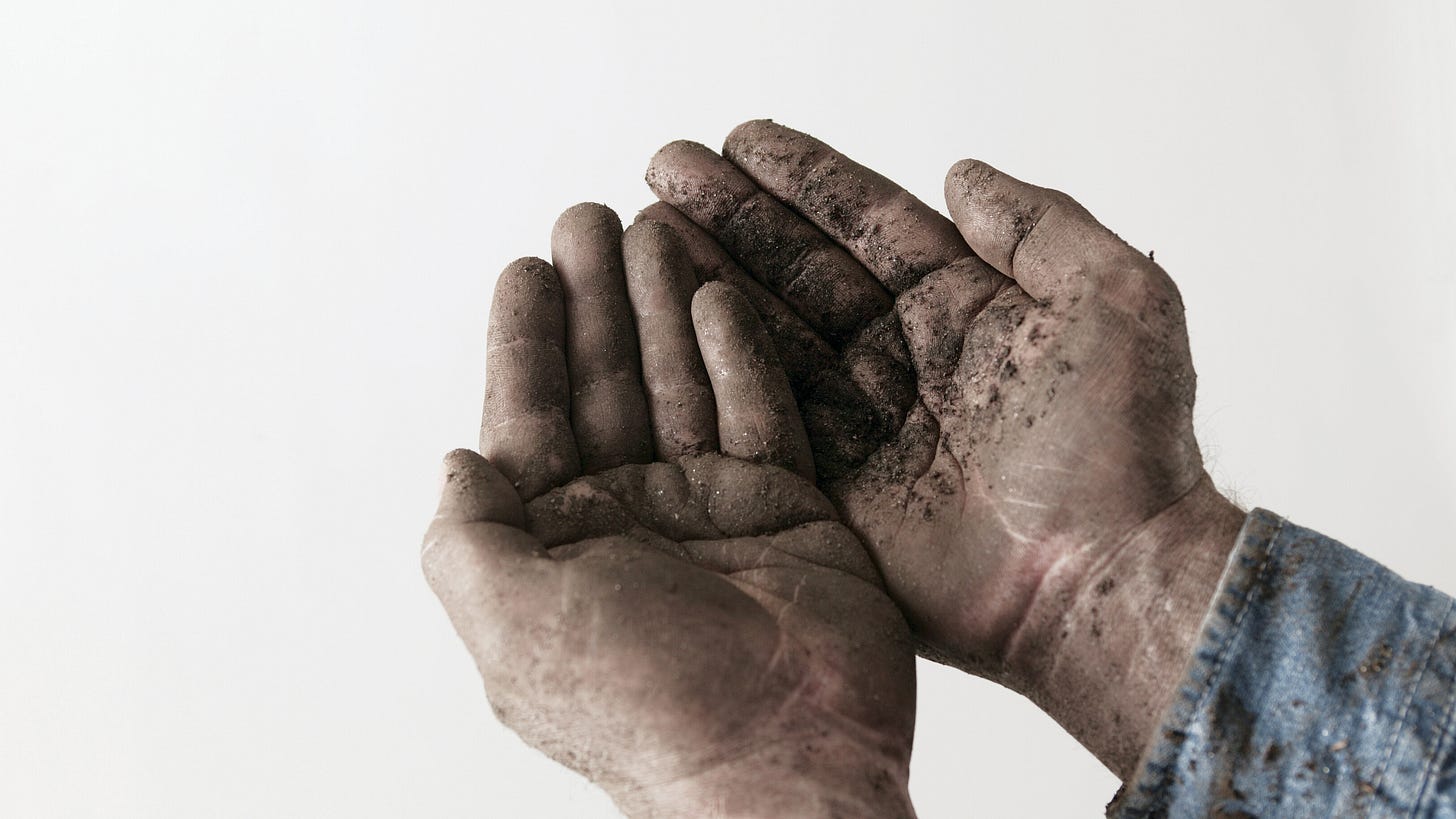What Are Men For?
God’s directions for men in Genesis 2 and the implications for our approach to health.
You may read the above title and ask, “Is Scott repeating himself already?”
By no means! In this post I mean to focus on Genesis 2, in search of principles to apply to bodily stewardship for men; that is, the male of the human species.
This was a natural direction for my thinking to go after considering God’s purposes in the creation of humanity. I am a human, and I am a man. There are some principles that will be applicable to all humanity, while others will be limited to certain subsets within humanity.
We are told in Genesis 1 that,
“God created man in his own image…male and female he created them” (v27).
Signalled here is a clear differentiation between males and females. The difference is evident in the world around us in various ways, which are not only physical. Contrary to some current opinions on gender issues, Genesis 1:27 tells us that God created male and he created female, and he created them distinct from one another at a foundational level.
The presence, nature, and significance of this distinction are subjects of much debate for the most recent generations of Western society. Cultural norms cannot be considered absolute truths around which to base our “gendered piety”, so I do want to simply adopt en bloc the practices of one of modern society’s various factions.
But if God is going to reveal in His word that he created male and female distinct from one another, there is every likelihood that he defines and directs that distinction elsewhere. The reader is not kept waiting long. Where Genesis 1 shows us the chief end of (hu)man, the next pages give some shape to the complementary natures and duties of men and women.
I could have been chivalrous and began distilling Biblical advice for women in this area first. I’m sure no one would have had quarrels with that.
But, like the airline passenger who is encouraged to put their own oxygen mask on first, or the man taking the plank out of his own eye, I first needed principles for rightly ordering my own life to God’s glory. Hence, I went in search of general, Biblical directions for how men are to live, and to what means and ends they are to steward their bodies.
In 1 Corinthians 11, man (in contrast to woman in the passage) is "the image and glory of God". The lives of men can make much of God and point to his divine nature and attributes, and some principles for doing so are outlined in in the second chapter of Genesis.
Our bodies play an integral part in participating towards our ordained ends, and we should develop and maintain them in such a way that enhances, and does not unnecessarily compromise, our ability to fulfil the roles.
The following sections will outline the roles assigned to man in Genesis 2 and the bodily considerations related to each. Upcoming posts will aim to fill these summaries out with more detail and consideration.
Note: All leaves are like “The Leaf”, but no two leaves are the same. In the same way I want to find what God has created all men to be, striving for obedience to Him, while also leaving room for prudence in the various limitations and necessities of each man’s context. I hope to outline universal principles that we can apply and avoid prescribing things like a minimum 1RM for deadlift before we get a “man card”.
Work
God is at work in creation and history. Men have been given the direction to join and partner with this work. There a couple of pieces of relevant evidence for this.
At the beginning of Genesis 2, there is “no man to work the ground” (v 5) . Then:
“The LORD God took the man and put him in the garden of Eden to work it and keep it” (v 15).
God then puts the man to work, bringing him the living creatures to name.
To look slightly ahead for another clue, God’s punishment for the man after the Fall affects his ability to work (Gen 3:17-19). Then man is driven from the garden
“to work the ground from which he was taken” (v 23).
So we see “work” is a prominent theme in the creation narrative. God is working throughout both Genesis 1 and 2 (and beyond), and men are called to partner with him in his work through history.
Despite the corruption of work by the Fall, it is not a “necessary evil”, and man’s call to it is not abrogated.
Our approach to health should therefore consider the development of strength and skill for our daily tasks, maintenance of our ability to physically function, and avoidance of risk factors for early illness, weakness and decay.
Protection
To consult Genesis 2:15 once again,
“The LORD God took the man and put him in the garden of Eden to work it and keep it.”
The same Hebrew word for “keep” is also used after the Fall to describe the duty of the cherubim and flaming sword which keep the Man and Woman out of the garden.
It would seem that the “keep” task of verse 15 includes keeping some things out. God’s rebuke of the Man in Genesis 3 indicates that keeping, or guarding, was a responsibility at which he failed.
The takeaway principle from this is that we should be able to protect ourselves and those under our care from at least some harms.
I believe the particular methods by which we fulfil this responsbility are matters of prudence and up for debate. But by strength, skill, or situation, the responsbility to protect is ours as men.
Fruitfulness
Last among the physical tasks in Genesis 2 is multiplication and fruitfulness. Some “fruitfulness” is achieved through work, as covered above.
There is another element to this direction. Man and woman were commanded to "be fruitful and multiply and fill the earth" (Gen 1:28). This at least involves reproduction and the propagation of the species, as well as the raising of children.
God sees that it is not good for man to be alone (Gen 2:18), and he makes woman as his companion. This is very good, and the man agrees enthusiastically (v 23).
"Therefore a man shall leave his father and mother and hold fast to his wife, and they shall become one flesh" (v 24).
This is, in part, an instruction on how to be fruitful and multiply. Within the “one flesh” concept is contained both the physical act of sex and the production and rearing of a child who is literally one flesh derived from their two parents.
I believe to steward our bodies rightly in fruitfulness, we should:
Be attractive versions of ourselves for our wives.
Develop and maintain sexual capacity, desire and ability, while avoiding risk factors for sexual dysfunction where possible.
Have the physical capacity to raise children and lead our households.
If we do the above, we cover the main physical steps in the process of producing children, little “one flesh” versions of ourselves and our brides.
So what?
Genesis 2 tells us that the primary responsibilities of men include work, protection, and reproductive fruitfulness. The exact application of these principles is, in some ways, a matter of prudence within context.
It is good to steward our bodies in such a way that:
Our working years are long, productive, and efficient.
We can defend ourselves and those under our care from (at least) some common or likely outside threats.
We are attractive to our future or current wife (same person, you rascals), participate in sexual intercourse in an enjoyable and fruitful way, and are capable of lifting, carrying, leading, and inspiring our children.
Another way to put it is that the health of a man becomes more aligned with ideal health as he performs his duties of work, protection, and start-to-finish procreation, as assigned by God in Genesis 2. Our function is optimised when we conform to this design.
For one neat and notable example, consider this: the level of testosterone, or “T”, in the blood is increased by exercise, particularly lifting heavy weights, both in the short term and long term. “T-working” gives us more “man hormone”.
(Don’t confuse T-working with T-werking. Bad results. Many such cases).
In modern society, there are many jobs which require almost no physical labour. “Work” in this sense does not increase T levels. The human body, particularly the male body, is designed to lift heavy things. Lower testosterone levels are associated with physical, sexual, and mental health problems. Men’s hormonal health is optimised when they lift heavy loads.
Heavy loads develop strength. Strength increases our ability to work. It also improves our chances of defending ourselves and our loved ones. The extra muscle we put on to produce that power makes us more attractive versions of ourselves.
And so, hopefully I have convinced the reader that there is a connection between men 1) fulfilling the roles prescribed by God in Genesis 2, and 2) experiencing better health. It is my hope that I have rightly identified things we “must” do and things that are left to prudence and Christian liberty.
Nearly done…
I know this post was long in the tooth about 1000 words ago, but it would be neglectful not to continue for just a little longer if you would bear with me.
If you agree with any of the preceding principles but feel disheartened by deficiency, please take heart. There is forgiveness for sins to be found in Christ where it is necessary. This is our greatest and realest need. He also promises wisdom (James 1:5; Col 1:9) and “power…endurance and patience with joy” (Col 1:11).
These promises are sure and are cause for great hope in the life of a Christian. It is my hope and prayer that in this context, the above content encourages and exhorts rather than rebukes or condemns.
But perhaps you are experiencing regret or hopelessness for years or decades spent in neglect of bodily stewardship. My encouragement to you is that it is not too late to implement healthy changes to your approach and behaviour, regardless of damage done to your long-term health.
The reality is that “work” is hard, and it is hard for everyone. Genesis 3 tells us this is unavoidable in our post-fall world.
Breaking unhealthy habits and forging new, healthier ones is going to be tough. In a future post, I would like to show that there is more good news to be found in Genesis 3 than we realise when it comes to the human condition and our relationship to work and health.
In the meantime, I would encourage you to begin responding in faith to God’s promises to give wisdom and power by implementing change. Choose one “action area” this week. Considering the points above, my suggestion is to begin with some form of “lifting” work, or strength training.
It does not need to be in a gym or with fancy equipment. You can start by lifting your own body (search for “calisthenics basics” or “bodyweight basics”, or ask me), jerry cans full of water, sandbags, laden wheelbarrows…you get my point. Add in some basic stretches to aid recovery and injury prevention. May it all be done with joy, and a product of grace-driven effort.





